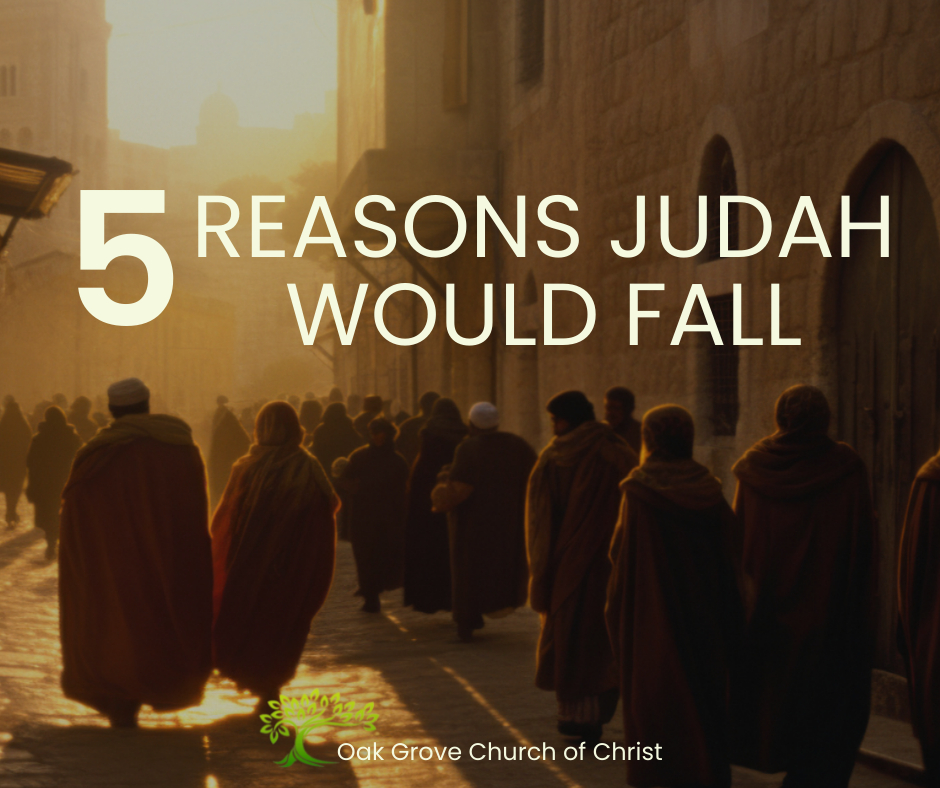
This morning, we are going to look at five reasons why Judah would fall. If you have your Bibles, turn to the book of Jeremiah. We will be looking at passages from the prophet Jeremiah and staying there for most of our lesson. We may reference a couple of other passages within the book, but our focus will remain in Jeremiah.
- Jeremiah 8:4-12
Our next lesson will examine five ways to keep ourselves from falling.
Jeremiah Prophesied that Judah Would Fall
Jeremiah: A Prophet to the Southern Tribes of Judah
Jeremiah, by way of background, is one of a few prophets who was sent to the southern tribes of Judah to prophesy to them, to give them instruction from God; to cause them to repent and turn from their wickedness, to come back and follow the law like God wanted them to.
And so, Isaiah and Jeremiah are probably two of the ones that we recognize most as prophets to the southern kingdom, the southern tribes of Judah.
- Judah is all Alone
What's interesting is that Judah is all alone at the time of the writing of the book of Jeremiah. You see the northern ten tribes were taken into captivity by the Assyrian army, about 720 B. C. which was about 720 B. C. almost a hundred years before.
- Israel Carried away by Assyrians - 720 B.C.
- 2 Kings 17:7-18 (Reasons Israel Fell)
If you wanted to look at the reasons why, we could go all the way back to 2 Kings chapter 17, and we could take a look at the vast number of reasons why God said He was done with them. They'd just had completed twenty to twenty-one kings. Not a single one of them was called good by God. They were all evil, every, one. At the time that they fell it seemed to be a little bit worse than the previous ones. Were there some that maybe had some moments, of clarity and did what God wanted to do for a moment? Yeah, maybe for a moment. But not enough that the northern tribes of Israel ever became good.
One of the primary reasons for Israel’s downfall was idolatry. We can trace this back to 1 Kings 12 when Jeroboam, the son of Nebat, changed the worship of God by establishing two golden calves, placing them in Dan and Bethel, and telling the people that these were the gods who brought them out of Egypt. Ever since that time, the northern tribes of Israel had fallen away from God, and they never did fix that. So, you have idolatry, the changing of the worship, continually provoking the Lord to anger.
- 2 Kings 17:17
This is where we are leading up to, Jeremiah telling the southern tribes of Judah, Hey, you guys need to get your minds right, you need to get your lives right with God, because what happened to your sister nation, the northern tribes of Israel, is about to happen to you because you're doing the very same things that they were doing, and God said, I've had enough.
This prophecy takes place about 20 years before they go into Babylonian captivity. Twenty years before, uh, Nebuchadnezzar comes and carries certain ones away. It's one of the three times that he does that. The nation of Judah is heading in the same direction as the nation of Israel. And that's not what God wants for His people.
- Jeremiah 8:4-12
5 Reasons Why Judah Would Fall are Laid Out in Jeremiah Chapter 8
1) My people, Judah, knows not the judgement of the Lord.
- Jeremiah 8:4-7
Five reasons why Judah would fall are laid out in Jeremiah 8:4-12. The first reason appears in verse 7: "My people do not know the judgment of the Lord."
In verse 4, God asks a series of rhetorical questions.
"Shall they fall and not rise?"
It's not common if you will. It's not natural for someone to fall down. And if they're not hurt really bad to try and get back up, right? You think concerning a child when they're learning to walk and they start to take those first steps, how many times do they fall down? There for a while [they fall] more than they're actually standing. They might stumble around and hold on to furniture a little bit so they can stand eventually because they try and they get a little stronger, they're able to stand and walk.
But, who of us does not consider getting back up when we fall? The thing concerning maybe football players. They go and they run a play and 90 percent of them are on the ground when the play's over, right? And they all get back up and they line up and they run another play. The ones that don't give up, they get carted off because something happened to them. Alright? Bye. They get up over and over to do what they're supposed to do.
It is like the people of God, these nations, these southern tribes of Judah, they've fallen down and it's like they don't even want to get up. They're done trying. They're not even going to try to be the people that God wants them to be. They recognize that they have fallen from where He wants them to be, and they're not going to do anything about it.
"Shall He turn away and not return?"
Notice, that question does not get answered. It's rhetorical.
A second question, shall He turn away and not return? Do we get lost and we don't seek to try and correct our being lost and actually get to where we're going? You know, before the GPS was on everybody's phone and you had to rely on paper maps or memory of where you were supposed to go. It may have happened once or twice that some of us guys weren't in the right place and probably should have stopped and asked somebody where we were supposed to go. I doubt many of us did. I didn't. Except one time I called my dad. So that doesn't count. He was exceptional at direction taking and giving directions and he could follow behind somebody to their house one time and forever know how to get to that house. It didn't matter where he came from.
When we get off course, what do we do? Do we just stay off course? I'm like, well if I go far enough in the wrong direction, I'll circle back around the other side of the globe to where I'm supposed to be. Hopefully, we don't do that. We should stop and evaluate where we are, understand where we are in relation to where we're trying to get to and change course if necessary.
They had fallen to the point that they had turned away from God, but they were not willing to return. They weren't willing to turn themselves back to God.
In that kind of a situation, who left who? Did God leave them behind and they could no longer find out where God was? I guarantee you; God hadn't moved.
- Hebrews 13:8
He doesn't change. He doesn't move from one location to another. It's you and me. It's these people who had moved away from God and refused to come back to be where God is.
"Why has this people slidden back by a perpetual backsliding?"
2) They rejected the word of the Lord
- Jeremiah 7:8-9
Here in these verses, we're given a list of several things that they were already doing. Namely, they were trusting in lying words.
Surely, we've never been guilty of that ourselves.
- Jeremiah 7:18
All of these things that they did, ended up provoking God to anger because they weren't offering to God their sacrifices of worship. They continued in their sin and wanted to offer worship to God at the same time. And that was just not going to be acceptable in the eyes of God. The second reason why Judah was going to fall is because they had rejected the word of God.
3) All given to covetousness
The entire nation, all the people, from the least even to the greatest, from the priest all the way on down to the peasant, was dealing falsely with their neighbor. If only there was some Old Testament guidance on how they should have treated one another.
- Exodus 20:17
All of these centuries later, the people are going to fall. They're going to be taken by the Babylonian army, and one of the reasons why is they're all given to covetousness. They all want what somebody else has. It's like the children who have all the toys that they could possibly want, and none of them are very good until they go to their neighbor's house, and their buddy has the best toys in the world. When they go back home, they don't want to play with theirs anymore.
- Isaiah 56:11-12
We're going to do it all over again the next day, and we're going to do it worse than we did it today, to a larger degree. Each one was dealing with their neighbor in a covetous way. It was; me, myself, and I, with no concern for anyone else. They were only looking out for their own self-interest.
4) Peace, peace when there is no peace
- Jeremiah 8:10-11
This was not the first time God had warned them that if they didn't repent, they were going to be dealt with. God had not left this a mystery to His people. However, they had those of the tribe of Levi, they had those that were of the priesthood, when God would pronounce a prophecy concerning them that they either repent and turn back to Him, or they're going to fall into Babylonian captivity. They said, "No, that's not going to happen." They said, "No, we're at peace with all of our neighbors. God's not going to do that to us. We have all these promises that say that the nation of Judah is going to be a perpetual nation. We're going to last forever. They say, peace, peace, when there is no peace." God has already spoken against them. Now he could change his mind as He'd done on various occasions, when they would repent of their wickedness and turn back to him. But that's not what was happening here.
They're looking at it like this. There's nothing to see here, folks. We're, we're just fine. We're doing just fine. It's, it's just God talking again. Let's be careful when we say that. Oh, I've heard that one before. It was about to happen to the nation of Judah.
They're denying the consequences that God said were going to, going to take place. Notice, they healed they have healed the hurt, slightly. They've brought a little bit of false hope to some people is really all they did by saying peace, peace, when there is no peace. They refused to accept prophecies that were spoken against them.
- Jeremiah 6:14-16
God told them everything that they needed to do in order to keep this from happening. And they refused to do it. Fourthly, peace, peace when there is no peace.
5) They were not ashamed
And finally, Jeremiah says, They were going to fall because they were not ashamed, neither could they blush, according to verse 12.
- Jeremiah 6:15
Speaking concerning the very same idea. They refused to be ashamed. It's common, if not expected, in many circumstances for someone who becomes embarrassed that it kind of shows up on their face at times, does it not? I have an older brother and when he was growing up he had reddish brown hair and freckles, because he had very fair skin. And, he burned rather easily. But he also, when he got embarrassed, it showed rather easily, too. Because his face would always get really red. That was not good for the rest of us, because we teased him a little bit about it. And, then we saw the embarrassment turn to anger he got even redder.
Embarrassment shows up in different ways on people's faces, but, it shows up normally. Jeremiah says, God says to Jeremiah, my people are gonna fall because they commit these sins, and they don't even care who knows what they're doing anymore. It does not embarrass them when somebody tells them they're doing things God doesn't want them to do.
It's a good thing we don't live in a society like that, do we? It's a good thing we don't act like that sometimes, do we? We think we're the perfect children of God. Nowhere in the New Testament has that ever been said. Nowhere in the New Testament has that ever been commanded, or taught. Do we want to be? Yeah, we want to be because Jesus is and the more we're like Him, that's what we ought to be looking for, striving for, working for. But, to not feel shame for standing against God is something that we ought not to do.
We definitely should feel shame for sinning against God. Notice how this affected God.
- Jeremiah 8:13, 20
Not being saved was going to be the condition of these people because they could no longer be embarrassed about turning away from the will of God. They were no longer embarrassed about going outside what God had told them to do.
Five reasons why Judah would fall.
You know, it's been said, for preachers decades ago that the perfect sermon was three points and a parable or a poem. Three points and a poem was the perfect sermon. Well, I know that that's not the case because God gave Judah five reasons why they were going to fall and there was no poem.
Sounds humorous to us, but 20 years after they received these words, they're being taken into Babylonian captivity, and they're going to be there for 70 years. There were individuals that were born going to be born in Babylonian captivity and die in Babylonian captivity, never knowing where they had come from all because these people did not heed the warnings that God gave them.
This evening, we're going to look at the ways that you and I can keep from the same fate as this Jewish physical nation. The nation of Judah, what they had to suffer. How can we keep ourselves from the spiritual faith in our lives today?
Maybe you're here reading, listening, a member of the body of Christ, but you no longer are blushing when you sin against the will of God. It doesn't affect you. It used to be a popular thing to say, at least when I was growing up, when you tried to express how grown up you were, and you were talking about either movies that you watched, or books that you read, or something like that, and it had some foul language and stuff in it. It's like, oh, it's got this and this in it, but, you know, it really doesn't bother me anymore. That just means we're becoming desensitized to sin, and we're not willing or able to blush anymore when we're confronted with it. Maybe that's where you are. Maybe you're like the horse that has his blinders on and you're running into the field of battle, but you're not going in the direction that God wants you to go.
Are you past the point of being willing to turn around and recognize your condition the way God sees it? And come back to Him before it's too late?
Maybe you're one who's never put on Christ in baptism. Maybe you're one who's never been a part of the kingdom of God before. You currently stand outside of God's salvation. I hope that's not where you want to be. I hope you want to be where the saved are, as a part of the church, a part of those that Jesus said He was going to save.
There are ways to do that. We can help you with that. Having heard the word, are you willing to believe it? Are you willing to repent of your sins and confess your faith in us as being deity? And submit to a watery grave of baptism and have your sins washed away by the blood of Jesus. Then, come out of that watery grave, a babe in Christ, ready to walk in the newness of life, and as a child of God, learn how to be more and more like Jesus every day.
If we can assist you, we encourage you to contact us, we would love to meet with you, study with you and help you to walk the path that Jesus taught.



